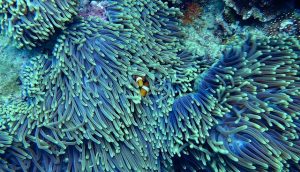These predatory creatures, feared by many, roam the ocean in search of their prey. Despite being among the top predators in the sea, they show no interest in humans. Shark attacks are relatively rare, contributing to their ominous reputation, but we must understand that we are not a part of their natural diet. Instead, sharks prefer to feast on marine mammals and fish. Statistically, the number of shark attacks worldwide remains low, especially when compared to the vast number of humans who venture into the oceans each year. While media coverage might occasionally sensationalize isolated incidents, it is essential to put these occurrences into perspective.
Globally in 2019, there were 64 reported shark attacks worldwide, with two fatalities, which is about average year over year, as stated in this Discovery Channel blog Are Shark Attacks on the Rise? Not Really.
The Beauty of This Creature
For as long as I can remember, i’ve never feared these animals, or much in the ocean for that matter. As a scuba diver, you are entering these animals homes and have to almost remain fearless as you dive deeper into the ocean. On almost every single dive trip I make, the dive instructors always ask what your hoping to see or what your favorite part is and my answer has always been any kind of shark. Aside from their beauty, I admire the way they are able to adapt and coexist with us coming into their home.
The beauty of sharks is a captivating marvel that has intrigued marine enthusiasts and scientists for generations. These ancient creatures, perfectly adapted to their oceanic habitats, exude power that leaves observers in awe. Firstly, their diverse range of species showcases an array of mesmerizing features. From the sleek and streamlined bodies of the oceanic whitetips to the majestic and formidable presence of the great white sharks, each species has its unique charm and characteristics. Their varied colors, patterns, and sizes add to their allure, making them a living canvas of nature’s artistry. Their role as keystone species is crucial in maintaining the delicate balance of marine ecosystems. By regulating the populations of prey species, sharks help preserve the health of coral reefs and seagrass beds, contributing to the overall biodiversity and ecological stability of the oceans.Furthermore, their behavior and social interactions are fascinating to observe. Some species exhibit complex courtship rituals, while others demonstrate sophisticated hunting techniques and communication patterns. Studying their behavior not only provides insight into their lives but also offers valuable lessons about the complexities of marine life.
Discovery Channel – Shark Week
Shark Week, a highly anticipated annual event on the Discovery Channel, is an incredibly educational and enlightening experience for audiences worldwide. This week-long television extravaganza celebrates one of the ocean’s most captivating creatures, the shark, and offers a wealth of information that promotes awareness and understanding about these enigmatic predators. One of the most significant aspects of Shark Week is its commitment to scientific accuracy and credibility. Each program is meticulously researched and reviewed by marine biologists, shark experts, and scientists. As a result, the information presented is reliable, up-to-date, and supported by evidence-based research. This dedication to accuracy ensures that viewers are exposed to authentic and trustworthy content, fostering a deeper understanding of sharks and their critical role in marine ecosystems.Shark Week goes beyond mere entertainment; it aims to dispel myths and misconceptions surrounding sharks. By showcasing their behaviors, habitats, and interactions with the environment, the programming helps debunk stereotypes and fear-driven narratives often associated with these magnificent creatures. Viewers gain insight into the true nature of sharks, appreciating them as fascinating animals rather than mere monsters.
Shark Conservation
Conservation efforts for sharks are of utmost importance, considering the vital role these majestic creatures play in maintaining the health and balance of marine ecosystems. Sharks are apex predators, meaning they are at the top of the food chain, regulating the populations of various marine species below them. Protecting sharks is not only crucial for the well-being of our oceans but also for the survival of numerous marine species and the overall ecological stability.
Several key aspects are essential in conservation efforts for sharks:
- Combating Overfishing: One of the most significant threats to shark populations is overfishing. The demand for shark fins and other shark-derived products has led to the unsustainable exploitation of these animals. Implementing and enforcing fishing regulations and sustainable fishing practices are vital to prevent further depletion of shark populations.
- Conservation of Habitats: Preserving and protecting the habitats where sharks live and breed is essential. This includes coral reefs, seagrass beds, and other vital ecosystems. Healthy habitats ensure that sharks have sufficient prey to feed on and provide safe spaces for reproduction.
- Promoting Responsible Tourism: Shark tourism can be a double-edged sword. When managed responsibly, it can provide economic incentives for local communities to protect sharks and their habitats. However, it is crucial to ensure that tourism activities do not disrupt or harm shark populations.
- Educational Awareness: Raising public awareness about the importance of sharks and the threats they face is essential. By dispelling myths and misconceptions and promoting an understanding of their ecological significance, people can become advocates for shark conservation.
- Research and Monitoring: Continued research on shark populations and their behavior is crucial for developing effective conservation strategies. Monitoring shark populations helps assess their status and identify areas that require immediate conservation action.
Conserving sharks is not only about protecting a fascinating species but also about safeguarding the delicate balance of marine ecosystems. Through a combination of international cooperation, sustainable practices, and public awareness, we can ensure that these magnificent creatures continue to roam our oceans for generations to come. By taking action now, we can secure a brighter future for sharks and the oceans they call home.




5 thoughts on “Shark Week July 23rd-29th: All About Sharks!”
Very good and well written. The information was informative. I maybe I won’t be so scared if I go to the ocean.
Excellent information! You have explained in a concise manner the importance sharks have in our ecosystem. Thanks.
I fear for the ocean. The biggest predator in the ocean is man. Current water temperatures around Florida are 100°. Not friendly to coral or fish. We have met the enemy and he is US.
I agree very much! Im hoping to publish something about this issue soon because i feel people would like to learn more and be aware of the current situation.
My name is Dessie Dorrian . I was a Scuba Diver for Shark’s Reef at Mandalay Bay in Las Vegas.with a team we would get into the tanks on a daily basis and dive with hundreds of sharks. No great whites , but Sharks all the same white and black tips Hammerheads and zebra sharks Stingrays and more. These sharks would see humans on a daily basis, so they weren’t too interested in us . We did wear steel mesh suits over our wet suits as a protective measure. There were a few like the zebra sharks that were so comfortable with us that I would gently pet them when they would lay on the bottom of the tank. Our job was mainly tank maintenance. Great job,great times.Ive moved on from there where I live in Ireland now and continued diving, this time a different type of fish I was a diver for a Salmon fishery again underwater maintenance with a different type of fish. These salmon were in nets and they’re would be thousands of them but they were harmless, and I was exciting. The nets were in a bay that was supplied by the Atlantic Ocean which surrounds Ireland. Great times great experiences